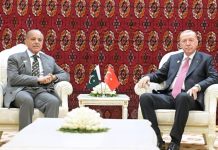From Sardar Shahab
LONDON: The abrupt closure of China’s consulate in Houston marks the latest incident in a rapidly escalating conflict between China and the United States. Future historians will probably focus on 2020 as the point when intensifying strategic competition between the United States and China turned into a new cold war.
The two superpowers are now engaged in conflict across multiple geographic theatres (South Asia, Southeast Asia, Australia, Europe, Africa and Latin America) and multiple vectors (trade, investment, technology, espionage, international institutions, health policy, naval, air power, missiles and territorial disputes).
The superpowers have articulated a lengthening list of grievances and almost no significant interests in common. Both are attempting to push third countries into an alliance system that would see the world carved into two decoupled blocs. Red versus Blue. With us or against us. Total confrontation. Basically the definition of cold war.
Some policymakers and strategic studies analysts still hesitate to employ the cold war concept, wary of the analogy with the decades-long U.S./USSR conflict and its implications for international relations in the medium and long-term. But there is no doubt both countries increasingly see and describe the conflict in existential terms.
The current U.S./China cold war has been building for some years, just like the U.S./USSR cold war experience which is commonly dated from 1947 but where antecedents were apparent in the latter part of the Second World War when the two countries were still nominally Allies in the United Nations.
There have been growing complaints about intellectual property theft, trade imbalances, espionage, diplomatic containment and encirclement and territorial disputes for almost a decade. So just as the U.S./USSR cold war really started much earlier (it was already evident in 1945) the U.S./China cold war began long ago. But in terms of a point where intensifying strategic competition turns into outright cold conflict, 2020 seems to mark the qualitative and quantitative turning point, and serves as much as a convenient date as 1947.
The coronavirus pandemic and sharpest economic recession for a century have heightened tensions and the conflict has now become a central issue in the U.S. presidential election with both major candidates determined to appear tough on China.



